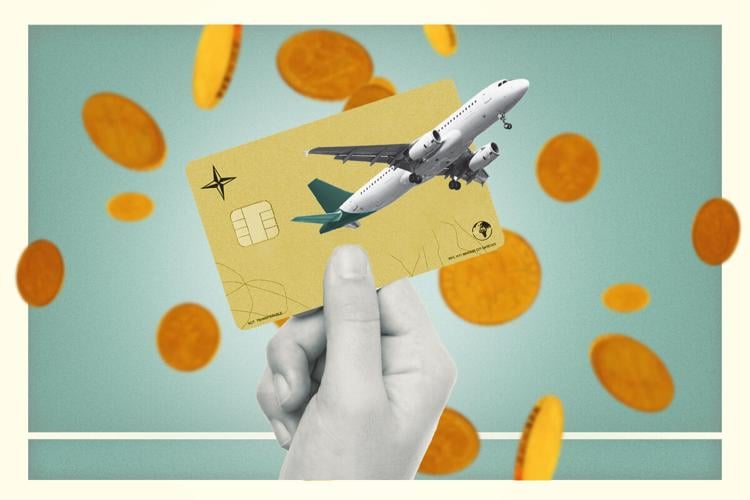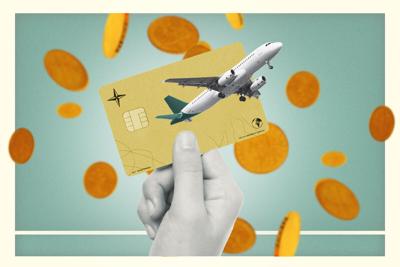Flying for free on Air Canada may soon be more expensive.
Members of the airlineÔÇÖs Aeroplan rewards program are worried that upcoming changes will make it tougher for some to earn points.
Aeroplan, which has more than nine million members, recently announced that, starting in January 2026, the company will shift to a revenue-based model that awards points based on dollars spent instead of distance flown. 
Under the new system, Aeroplan members will earn one point for every dollar spent on the base fare plus carrier surcharges and e-upgrade add-on fees of eligible Air Canada flights. Those who qualify for Aeroplan Elite Status will be able to earn up to six times the points.
Under the current system, members get points for every mile flown, at a rate depending on the type of fare. 
The new program ÔÇťaims to provide more for members who are most engaged,ÔÇŁ the airline said in its announcement.
ÔÇťItÔÇÖs a nice way of saying those who spend the most will get the most benefits,ÔÇŁ says ╔ź╔ź└▓-based personal finance and travel expert Barry Choi.
Today, if you purchased an economy flex fare ticket for $350 on a one-way flight from ╔ź╔ź└▓ to Vancouver (around 2,076 miles), you would earn 2,076 points. More basic economy gave less than one point per mile, while Aeroplan Elite members earned points at the same rate as base members.
Under the new system, that ticket would earn just 350 points, but those with higher-tier memberships ÔÇö now earned under a new, simplified status-point system ÔÇö have the chance to earn a lot more. Aeroplan Elite 25k members will receive double the points, while top-tier Super Elite members get six points for every dollar, or 2,100 points on the same flight.
So, who wins with the new program? Frequent business travellers who often purchase expensive, last-minute tickets.
ÔÇťThose who already hold status and usually pay cash for higher-end fares will find it easier to re-earn status and achieve those milestone rewards,ÔÇŁ Choi notes.┬á
ÔÇťThe majority of our customers are travelling on short and medium-haul flights,ÔÇŁ says Scott OÔÇÖLeary, vice president of loyalty and product at Air Canada. ÔÇťThis is not a cost-saving measure for us. We’re going to be issuing the same amount of points, if not slightly more than we did before.ÔÇŁ
OÔÇÖLeary estimates more than 85 per cent of Aeroplan members will be the same or better off under the new program.
Patrick Sojka, founder of Calgary-based Rewards Canada, says the new system has more negatives than positives. He believes it will mainly benefit travellers who fly on their companyÔÇÖs dime or have the funds to buy more expensive fares that earn elite status faster.
Travellers who look for the cheapest price possible for longer flights will likely see the biggest hit, Choi says.
Montreal resident Stefan-Michael Wedenig says the changes to Aeroplan will be ÔÇťdisastrousÔÇŁ for him.
We do the math on who wins and loses under┬áAir CanadaÔÇÖs new Aeroplan loyalty program.
Kelsey WilsonWedenig has been an Aeroplan member since 2019. As the executive director at the Institute of Air and Space Law at McGill University in Montreal (he emphasizes heÔÇÖs speaking from his personal experience and not as in his professional capacity), he typically travels to up to 30 countries, covering around 140,000 miles each year to visit family in Austria, conduct business in Asia and visit friends in ╔ź╔ź└▓.
Wedenig currently holds 75,000 status points, which puts him in , with access to perks like complimentary lounge access and seat selection.
The new system replaces three different types of ÔÇťstatus-qualifyingÔÇŁ points with one total of Status Qualifying Credits (SQC), based on dollars spent. Members will get two times the SQC per dollar on standard fares and four times the SQC on flex fares and above.
The distance Wedenig travelled, plus the amount he spent and the number of flights he took this year, cleared him comfortably under the current system, he says, but if he spends roughly the same next year, it will only clear him for 35,000 points ÔÇö two tiers down.┬á

Montreal resident and Aeroplan member Stefan-Michael Wedenig travels 140,000 miles every year and says the changes to the program will be ÔÇťdisastrousÔÇŁ for him.
Stefan-Michael WedenigÔÇťThis is a huge downgrade,ÔÇŁ he says, adding that he would lose lounge access and priority services. Air Canada has devalued the program and has the ÔÇťaudacityÔÇŁ to present it as an improvement, he says.
The new system ÔÇťwill disproportionally punish people with lower status,ÔÇŁ he says, ÔÇťeven though they pay the same price as higher status customers.ÔÇŁ
OÔÇÖLeary acknowledges that not all customers are happy with the upcoming changes.
ÔÇťItÔÇÖs very difficult for us to stand up and say that these changes are universally positive because theyÔÇÖre not, but it really does depend on how you travel,ÔÇŁ OÔÇÖLeary says. ÔÇťOur customers that spend a lot with us didnÔÇÖt feel it was fair for them to be rewarded the same way as somebody spending one third as much on their ticket.ÔÇŁ The higher up Aeroplan members are in their status tiers, he adds, the more they pay attention to the points that they earn.
For base Aeroplan members who donÔÇÖt have higher status, the company is going to invest in frequent, more engaging promotions, he says.
ÔÇťYou might see triple points as an offer to go from ╔ź╔ź└▓ to Vancouver or four times the points to go to New York.ÔÇŁ
Sojka says there are upsides for the ultra-conscious budget traveller who only flies once a year (or less), since they may actually earn more points in the new program.
Boring businesses (think junk removal, car washes, laundromats) arenÔÇÖt as flashy as new
Right now, if you purchase the cheapest basic economy fare within Canada, you only earn points for 10 per cent of the distance travelled, so a 500-mile flight will only get you 50 points. Under the new program, you could earn 200 points for a $200 ticket.
OÔÇÖLeary also points out that members at the lower level of the program have had difficulty telling exactly how far along they were in earning higher status levels.┬á
Lori Hayes, 62, a frequent traveller and Elite Aeroplan member who lives in Severn, Ont., appreciates the more simplified framework of SQC being based on dollars spent. (The current system requires customers to use the Aeroplan app to figure out three separate totals of Status Qualifying Dollars, Status Qualifying Miles and Status Qualifying Segments.)
ÔÇťI think the revamp of the program may be easier to understand,ÔÇŁ she says.
Hayes also has the TD Aeroplan Visa and says she currently gets $1,500 worth of value each year out of it.
ItÔÇÖs important to have a conversation with loved ones you’re thinking of transferring the
For folks who are still hoping to earn Aeroplan points despite these changes, Choi points out that getting a co-branded Aeroplan credit card can earn you points on every purchase.
Under the new program, those who have a core Aeroplan credit card (such as the TD or CIBC Aeroplan Visa Infinite Card) will also earn 1,000 SQC per $20,000 spent.
Those with a premium Aeroplan credit card (such as the American Express Aeroplan Reserve Card) will get the same amount per $5,000 spent. 
ÔÇťThis is clearly a push to get more people to sign up for the premium card,ÔÇŁ Choi says.
Regardless of what card you have, youÔÇÖre capped at earning a maximum of 25,000 SQC on only credit card purchases. That works out to spending $125,000 on an ultra-premium Aeroplan credit card, or $500,000 of spending on a core card ÔÇö a ÔÇťpretty insaneÔÇŁ total, says Sojka.
There are other perks to Aeroplan credit cards aside from earning points; families could benefit from one of the core credit cards since it includes free checked luggage on Air Canada flights, Choi says. Those who travel frequently for work may find the premium credit cards appealing since they come with extra Air Canada perks such as Maple Leaf Lounge Access and Priority Boarding.
For families who frequently fly with Air Canada, Choi suggests setting up an Aeroplan Family Sharing Plan.
ÔÇťThis allows up to eight family members to combine their points, enabling quicker redemptions,ÔÇŁ he explains.
Choi says that for those who currently have 35,000 Aeroplan points or more, itÔÇÖs probably worth doing some math to see what your current spend would get you under the new system.
ÔÇťThere are some user-made calculators floating around online already,ÔÇŁ he says. ÔÇťThis will give you a clear idea of what you may need to spend to maintain your status.ÔÇŁ
HereÔÇÖs what experts say Canadians should consider when it comes to maintaining a healthy
Nothing has changed as far as redeeming points, Choi points out.
ÔÇťAeroplan is still one of the most lucrative airline loyalty programs in the world since you can use your points on any available Air Canada seat,ÔÇŁ he says.
Choi also suggests signing up for AeroplanÔÇÖs news and offers updates to find promotions that can boost the amount of SQC you earn.
ÔÇťThat can be very helpful if you think youÔÇÖll be short a certain amount for status,ÔÇŁ he says.
ItÔÇÖs worth looking at other programs that may better suit your travel style. Those located in Alberta may find WestJet more convenient, Choi says, ÔÇťbut their loyalty program is still not as good as Aeroplan.ÔÇŁ
Folks who fly often with Porter Airlines can check out their VIPorter loyalty program.
You may also want to consider a general loyalty program that offers more flexibility.
ÔÇťFor example, American Express Membership Rewards where you can use your points on any purchase charged to your card,ÔÇŁ Choi says, while RBC Rewards (Avion) allows you to transfer your points to WestJet Rewards and British Airways Avios.
For those who are worried about losing out under the new rules, Choi says to start looking at other airlines for the best price.
ÔÇťThereÔÇÖs no reason to be loyal if youÔÇÖre not getting anything out of it.ÔÇŁ




































To join the conversation set a first and last name in your user profile.
Sign in or register for free to join the Conversation